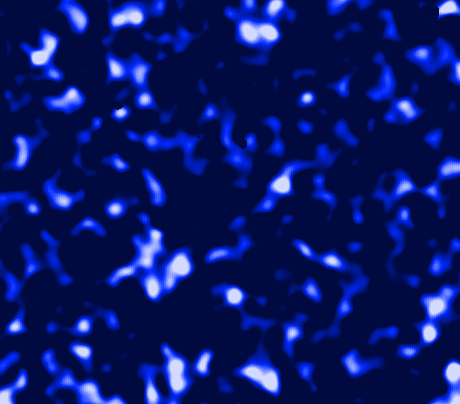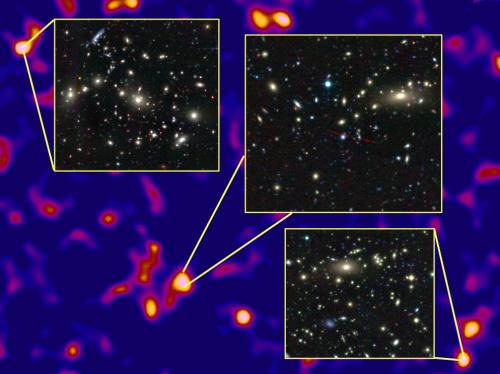It looks like you're using an Ad Blocker.
Please white-list or disable AboveTopSecret.com in your ad-blocking tool.
Thank you.
Some features of ATS will be disabled while you continue to use an ad-blocker.
4
share:
Using gravitational lensing as predicted by Einstein's General Theory of Relativity, astronomers have produced a Dark Matter map of our universe out
to 1 billion light years:

These observations are the largest scale map of Dark Matter every produced.
It looks like Dark Matter is everywhere and closely associated with visible matter, i.e. galaxies:

www.physorg.com...

The observations show that dark matter in the Universe is distributed as a network of gigantic dense (white) and empty (dark) regions
These observations are the largest scale map of Dark Matter every produced.
This is the first direct glimpse at dark matter on large scales showing the cosmic web in all directions.
It looks like Dark Matter is everywhere and closely associated with visible matter, i.e. galaxies:

The densest regions of the dark matter cosmic web host massive clusters of galaxies.
www.physorg.com...
Very cool, hopefully it will end up telling us a lot more about dark matter
Nice post.
I'm not smart enough to get the pictures..could be anything as far as im concerned haha..
but yea, dark matter, basically everything inbetweem "everything".
I'm not smart enough to get the pictures..could be anything as far as im concerned haha..
but yea, dark matter, basically everything inbetweem "everything".
reply to post by dannotz
The white blobs in the first picture is where they say the dark matter is. And there is a large amount of it. It not only surrounds galaxies but groups of galaxies (clusters).
The white blobs in the first picture is where they say the dark matter is. And there is a large amount of it. It not only surrounds galaxies but groups of galaxies (clusters).
Good topic -Thanks for the info.
I do not think space is the vacuem I was taught to believe it is
We only see a small portion of the whole picture as your pics show.
Technology allows us to glimpse things our senses can not
So much more to understand than we presently know
I do not think space is the vacuem I was taught to believe it is
We only see a small portion of the whole picture as your pics show.
Technology allows us to glimpse things our senses can not
So much more to understand than we presently know
reply to post by Nicolas Flamel
Thanks
And yea, isn't most of the Universe made up of the stuff?
Something like 98% of the Universe is dark matter, right?
Thanks
And yea, isn't most of the Universe made up of the stuff?
Something like 98% of the Universe is dark matter, right?
reply to post by dannotz
According to NASA:
science.nasa.gov...
I don't think we even know how to detect dark energy yet, but we see the effects of it since galaxies are speeding up after the big bang. They should be slowing down because of the effects of gravity if there was no dark energy.
Space seems not to be as empty as we thought. Until only recently scientists thought space was not empty but an "ether" in which things happened. Given the fact of dark matter and energy, particles popping into and out of existence, space being curved around objects like stars and planets, space seems to be more than just a vacuum.
According to NASA:
It turns out that roughly 70% of the Universe is dark energy. Dark matter makes up about 25%. The rest - everything on Earth, everything ever observed with all of our instruments, all normal matter - adds up to less than 5% of the Universe.
science.nasa.gov...
I don't think we even know how to detect dark energy yet, but we see the effects of it since galaxies are speeding up after the big bang. They should be slowing down because of the effects of gravity if there was no dark energy.
Space seems not to be as empty as we thought. Until only recently scientists thought space was not empty but an "ether" in which things happened. Given the fact of dark matter and energy, particles popping into and out of existence, space being curved around objects like stars and planets, space seems to be more than just a vacuum.
reply to post by Nicolas Flamel
Do you think perhaps that somehow the visible cosmos of galaxies is somehow fueled by dark energy or matter thus causing the galaxies to speed up as you state???
Do you think perhaps that somehow the visible cosmos of galaxies is somehow fueled by dark energy or matter thus causing the galaxies to speed up as you state???
Originally posted by artistpoet
reply to post by Nicolas Flamel
Do you think perhaps that somehow the visible cosmos of galaxies is somehow fueled by dark energy or matter thus causing the galaxies to speed up as you state???
They are still trying to figure it out, but dark energy seems to have the opposite effect of gravity in that it pushes things apart rather than attracting them together.
Physicists refer to it as follows:
Two proposed forms for dark energy are the cosmological constant, a constant energy density filling space homogeneously,[3] and scalar fields such as quintessence or moduli, dynamic quantities whose energy density can vary in time and space
If anyone knows what this means, let us know.
en.wikipedia.org...
Like dark matter, I think we will eventually know what these "dark" things are and give them proper names.
new topics
-
President BIDEN's FBI Raided Donald Trump's Florida Home for OBAMA-NORTH KOREA Documents.
Political Conspiracies: 2 hours ago -
Maestro Benedetto
Literature: 3 hours ago -
Is AI Better Than the Hollywood Elite?
Movies: 3 hours ago -
Las Vegas UFO Spotting Teen Traumatized by Demon Creature in Backyard
Aliens and UFOs: 7 hours ago -
2024 Pigeon Forge Rod Run - On the Strip (Video made for you)
Automotive Discussion: 8 hours ago -
Gaza Terrorists Attack US Humanitarian Pier During Construction
Middle East Issues: 8 hours ago -
The functionality of boldening and italics is clunky and no post char limit warning?
ATS Freshman's Forum: 9 hours ago -
Meadows, Giuliani Among 11 Indicted in Arizona in Latest 2020 Election Subversion Case
Mainstream News: 10 hours ago -
Massachusetts Drag Queen Leads Young Kids in Free Palestine Chant
Social Issues and Civil Unrest: 10 hours ago -
Weinstein's conviction overturned
Mainstream News: 11 hours ago
top topics
-
President BIDEN's FBI Raided Donald Trump's Florida Home for OBAMA-NORTH KOREA Documents.
Political Conspiracies: 2 hours ago, 16 flags -
Krystalnacht on today's most elite Universities?
Social Issues and Civil Unrest: 13 hours ago, 9 flags -
University of Texas Instantly Shuts Down Anti Israel Protests
Education and Media: 16 hours ago, 8 flags -
Supreme Court Oral Arguments 4.25.2024 - Are PRESIDENTS IMMUNE From Later Being Prosecuted.
Above Politics: 13 hours ago, 8 flags -
Weinstein's conviction overturned
Mainstream News: 11 hours ago, 7 flags -
Massachusetts Drag Queen Leads Young Kids in Free Palestine Chant
Social Issues and Civil Unrest: 10 hours ago, 7 flags -
Gaza Terrorists Attack US Humanitarian Pier During Construction
Middle East Issues: 8 hours ago, 7 flags -
Meadows, Giuliani Among 11 Indicted in Arizona in Latest 2020 Election Subversion Case
Mainstream News: 10 hours ago, 5 flags -
Las Vegas UFO Spotting Teen Traumatized by Demon Creature in Backyard
Aliens and UFOs: 7 hours ago, 4 flags -
2024 Pigeon Forge Rod Run - On the Strip (Video made for you)
Automotive Discussion: 8 hours ago, 3 flags
active topics
-
President BIDEN's FBI Raided Donald Trump's Florida Home for OBAMA-NORTH KOREA Documents.
Political Conspiracies • 5 • : budzprime69 -
Is AI Better Than the Hollywood Elite?
Movies • 11 • : rickymouse -
Supreme Court Oral Arguments 4.25.2024 - Are PRESIDENTS IMMUNE From Later Being Prosecuted.
Above Politics • 83 • : Sookiechacha -
Sol Et Luna - TIME2024
Short Stories • 10 • : BrotherKinsMan -
University of Texas Instantly Shuts Down Anti Israel Protests
Education and Media • 263 • : cherokeetroy -
Massachusetts Drag Queen Leads Young Kids in Free Palestine Chant
Social Issues and Civil Unrest • 13 • : ToneD -
Gaza Terrorists Attack US Humanitarian Pier During Construction
Middle East Issues • 26 • : nugget1 -
British TV Presenter Refuses To Use Guest's Preferred Pronouns
Education and Media • 168 • : Annee -
Manly P. Hall says Freemasonry is a religion?
Secret Societies • 22 • : Therealbeverage -
One Flame Throwing Robot Dog for Christmas Please!
Weaponry • 11 • : Therealbeverage
4
